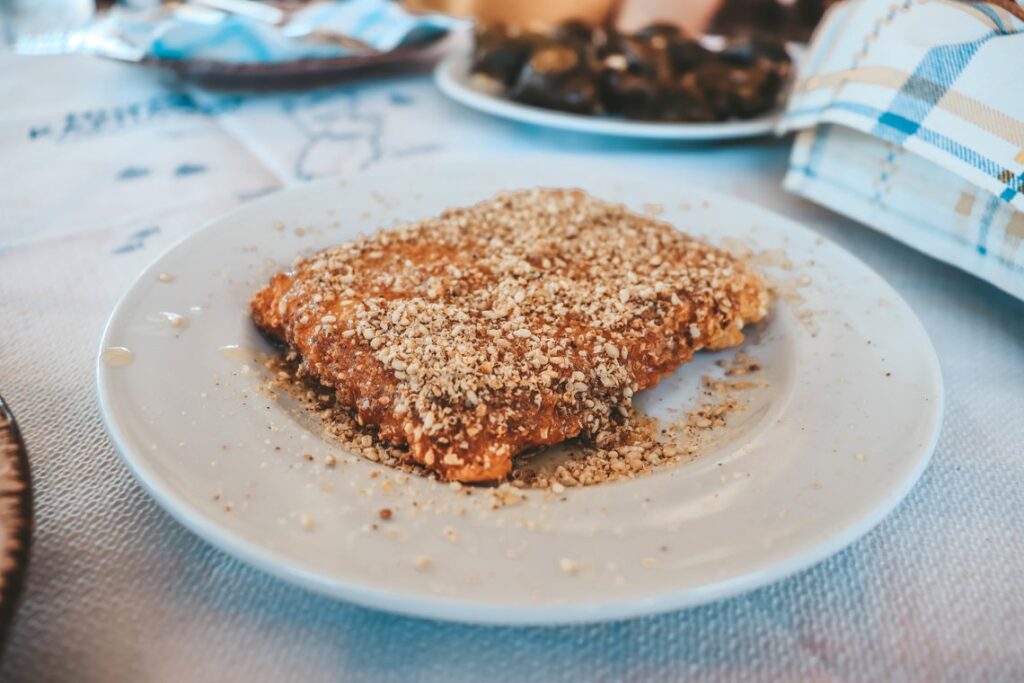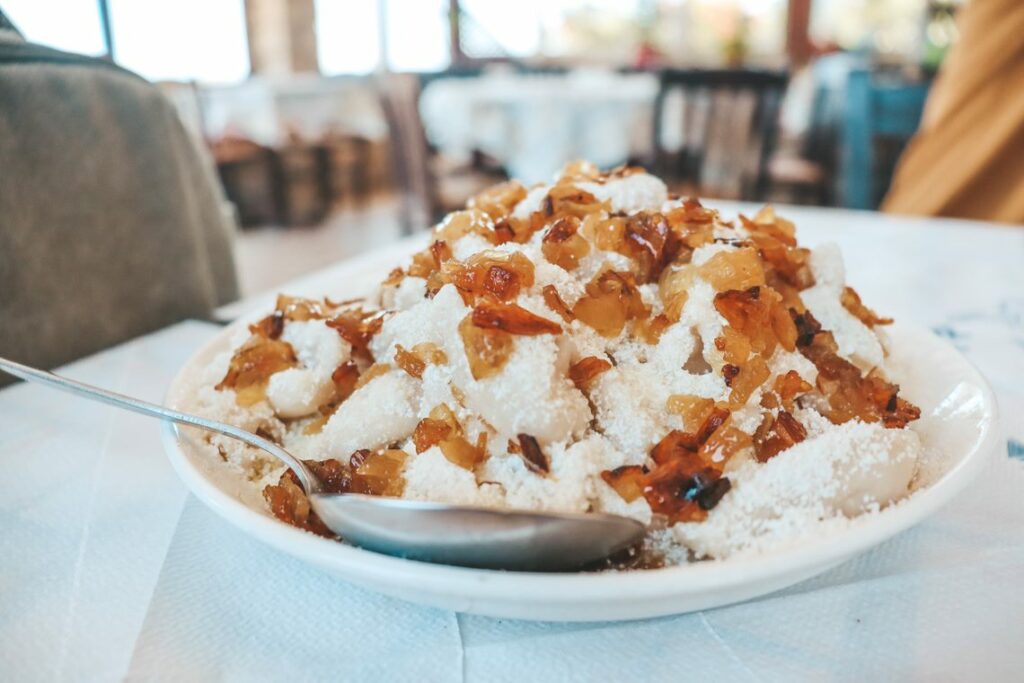Greek cuisine is known for its delicious and healthy Mediterranean diet, which emphasises fresh, wholesome ingredients and straightforward preparation methods. From traditional dishes such as moussaka and souvlaki to fresh seafood and vibrant salads, Greek cuisine offers a diverse range of flavours and textures that are sure to satisfy your palate. We’ll look at the key ingredients, dishes, and traditions that make up this rich and flavorful culinary tradition in this guide to Greek cuisine and food.
Key Ingredients
The following are some key ingredients in Greek cuisine:
- Olive oil: Used in almost every Greek dish for its rich flavour and health benefits, olive oil is a staple of the Mediterranean diet.
- Herbs and spices: Oregano, thyme, mint, and cinnamon are popular herbs and spices in Greek cuisine, and they are used to add flavour and aroma to dishes.
- Tomatoes, cucumbers, eggplant, peppers, and onions are common ingredients in Greek salads and vegetable dishes.
- Grains and legumes: Rice, bulgur, lentils, and chickpeas are common ingredients in Greek salads, soups, and stews.
- Fresh seafood: Because of Greece’s coastal location, fresh seafood is abundant and popular in dishes such as grilled octopus and baked fish.

Traditional main-dishes
Some of the most popular traditional Greek dishes include:
- Moussaka: A layered dish consisting of eggplant, ground meat, and a creamy béchamel sauce.
- Souvlaki: Grilled marinated meat skewers, typically pork, chicken, or lamb, served with pita bread and tzatziki sauce.
- Stifado: a slow-cooked beef or rabbit stew with onions, garlic, tomatoes, and spices like cinnamon and bay leaves.
- Spanakopita: A savoury pie wrapped in phyllo pastry with spinach and feta cheese.
- Greek salad: A light salad with tomatoes, cucumbers, onions, feta cheese, and olives that is tossed in olive oil and vinegar.
- Dolmades: Stuffed grape leaves with rice, herbs, and occasionally meat.
- Pastitsio: A baked pasta dish consisting of layers of pasta, ground meat, and béchamel sauce.
Traditional Greek starters
Traditional Greek appetisers, or meze, are an important part of Greek cuisine and are typically served with drinks before a meal. Meze plates are frequently served with a variety of small dishes, such as:
- Tzatziki: A creamy yoghurt, cucumber, and garlic dip.
- Fava: A yellow split pea puree that is frequently topped with onions and olive oil.
- Dolmades: Stuffed grape leaves with rice, herbs, and occasionally meat.
- Kalamata olives: A type of black olive that is popular in Greece.
- Grilled octopus: A popular seafood dish served with lemon and olive oil.
- Meze plates are an excellent way to sample a wide range of flavours and textures in Greek cuisine, and they are ideal for sharing with friends and family.
Healthy Mediterranean Diet
The Mediterranean diet has been linked to the longevity and health of people living in blue zones all over the world. People in blue zones live significantly longer and healthier lives than the global average. With its emphasis on fresh, whole foods and healthy fats like olive oil, the Mediterranean diet has been shown to lower the risk of heart disease, cancer, and other chronic illnesses. Following a Mediterranean diet and incorporating blue zone lifestyle habits can help improve your health and extend your life.

Dining Traditions
Family and community are central to Greek dining traditions, with meals frequently shared with friends and extended family. Meals often include multiple courses and a variety of dishes, with guests encouraged to try them all. Greeks love to eat, and special occasions such as weddings, baptisms, and name days are marked with elaborate feasts. Late dinners are common in Greece, with the average time for dinner ranging from 9 p.m. to 11 p.m. This is due in part to the warmer weather and the siesta ritual. Finally, Greek cuisine is a rich and flavorful culinary tradition that emphasises fresh, wholesome ingredients, straightforward preparation methods, and communal dining. Greek cuisine offers a diverse range of flavours and textures, from traditional main dishes like moussaka and souvlaki to fresh seafood and vibrant salads. The healthy Mediterranean diet, which is associated with longevity and good health in blue zones around the world, includes key ingredients such as olive oil, herbs, and vegetables. Traditional Greek appetisers, or meze, are ideal for sharing with friends and family, and Greek dining traditions revolve around community and celebration. Overall, exploring Greece’s delicious and healthy cuisine is a must for any foodie and traveller.

Must-try dishes – Some of the most popular dishes in Greek cuisine include moussaka, a layered eggplant and ground beef casserole; souvlaki, skewered and grilled meat or vegetables; and spanakopita, a spinach and feta cheese pastry. Other must-try dishes include tzatziki, a yoghurt and cucumber dip; dolmades, stuffed grape leaves; and baklava, a sweet pastry made with honey and nuts.
Greek cuisine offers a delicious and healthy way of eating that has been enjoyed for thousands of years. Its fresh ingredients, healthy cooking techniques, and emphasis on whole foods make it a great choice for anyone looking to improve their diet and enjoy delicious meals at the same time.
In summary, Greek cuisine is renowned for its fresh and flavorful ingredients, healthy cooking techniques, and rich history. Its emphasis on whole foods and the Mediterranean diet makes it a great choice for anyone looking to eat healthier while enjoying delicious and satisfying meals. So whether you’re a fan of moussaka, souvlaki, or baklava, there’s no better time to explore the delicious and healthy world of Greek cuisine.







